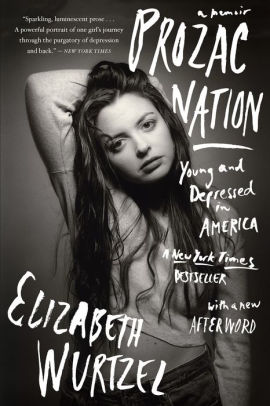The Underrated Work of Elizabeth Wurtzel
Elizabeth Wurtzel was an American writer and journalist. Throughout her career Wurtzel wrote many books, most notably, Prozac Nation, which pioneered the genre known today as a memoir. Wurtzel’s work spanned a variety of publications, namely: The Wall Street Journal, Elle, New York Magazine and many others. Her career can be described as polarizing for a variety of reasons, whether it be the honest and open tone she took when writing about her struggles with mental illness, or the fact that she was a woman who called attention to herself rather than hiding behind a man. It is safe to say that Elizabeth Wurtzel was ahead of her time.

When Prozac Nation was published in 1994, it was met with a wave of negative responses. Prozac Nation was Wutzel’s first book. It told the story of the trials she went through as an adolescent growing up with depression, in a time when depression was just beginning to be recognized. At its core the book was a memoir that made life’s pain seem purposeful. It accurately and authentically conveyed the feeling of despair many people face throughout their lives. The disconfirming response Prozac Nation garnered was not for lack of content or skilled authorship, but solely for the reason that it was written by a woman. The New York Times Book Review accused Wurtzel of being, “Sylvia Plath with the ego of Madonna,” insinuating that Wurtzel was unhinged and egotistical. Not only does this critique fail to address Prozac Nation as a piece of literary work, it also applies negative connotation to the traits of other talented women in an attempt to demonize and label Wurtzel’s existence.
After the publication of Prozac Nation it became fashionable to dislike Elizabeth Wurtzel. This was a trend rooted in misogyny and not at all based on her skill as a writer. These views, to this day, act as a barrier between the public and Wurtzel’s legitimacy and impact as an author. The opinions of these sexist critiques haunt Wurtzel’s legacy.
To assume that Wurtzel’s work met harsh criticism solely because of its tendency to be bleak and highlight the human flaw is misguided logic. If bleak thematic choices constitute hateful and abrasive comments, then pieces such as Catcher in the Rye, by J.D. Sallinger and The Swimmer, by John Cheever would have met the same reaction as Prozac Nation. These three stories all address honest and stark themes; however, there are two factors separating them: both Catcher in the Rye and The Swimmer are written by men and, not all too incidentally, both were, and still are, regarded as masterful works of literature.
When a man writes his opinions about the world, his world, he is met with praise. When a woman steps forward and tells her opinions she is called a narcissist, told she demands too much attention and is ultimately silenced and forgotten. This is a trend that still rings true today.
Wurtzel remained unapologetic through the course of her career. She believed in her work, and in herself, despite discouraging feedback. Towards the end of her life she wrote an article reviewing her achievements and said, “Sorry for what? I’m not sorry about anything. I was never sorry when I said I was. Apologies are a courtesy, I love to argue. I am in it for the headache. I don’t need you to be on my side – I’m on my side.” Her nature and writing persona was nothing like that of Sylvia Plath, whom she was often negatively associated with. Wurtzel was outspoken and strong where Plath was much less verbal. This did not matter because Wurtzel’s writing was never analyzed for persona or substance. Part of the reason why her work is not given the praise and recognition it deserves is because the public put Wurtzel in a box. Time was never taken to look past that label at what she had actually accomplished. She soon became another example of sexism getting in the way of an outspoken woman.
The purpose of Elizabeth Wurtzel’s work was not to fit into society’s idea of what a woman should do, think, or say. She wrote for the future, to pioneer a path so that people similar to her (young, depressed, and powerful) could have a platform to speak and improve the world. She herself knew that her work was ahead of its time; in an article she wrote in The Guardian she says, “I was a riot girl, I was a do-me femmenist, and I was posed topless giving the world the finger on the cover of my second book.” She intended to be the spark that started a massive flame, and in a way she was.
On January 7th of 2020 Wurtzel lost her battle with cancer. She may be dead, but her work lives on.
We are living through a time of constant change, and there is an ongoing battle between the oppressed and the oppressors. Strong, unapologetic, trail-blazing women, like Elizabeth Wurtzel, began the narratives that called for change. We must continue them. The truthful nature of her work scared people and led critics to feel uncomfortable or dislike her. She was not discouraged by this and never hesitated to tell her story; she was insistent that women have a right to feel. Now that she is gone, we must take it upon ourselves to carry on her legacy, and we cannot let another talented woman’s message be washed away by time. Sexism cannot continue to get in the way of women who want to make a difference. The future Elizabeth Wurtzels will not be silenced.





